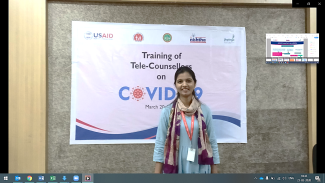The phone lines have been buzzing nonstop and Monica Mishra knows that now is not the time for the water break that she has been wanting to take for the last half an hour. Her ears are red from the headset. But she knows the next caller is more important.
Mishra is one of the tele-counsellors at the “104 Health Helpline” in the state of Madhya Pradesh. The state has a network of tele-counsellors across “104 Helpline,” “108 Emergency Ambulance Helpline” and the “181 Chief Minister’s Helpline,” and currently, the state government requested the tele-counsellors on all three helplines to respond to the emergency situation due to COVID-19.
“Since the COVID-19 outbreak, we get so many calls in a day, sometimes nearly 600. Nobody knew about this disease before; it just appeared suddenly and became this pandemic. People would ask questions on how to protect themselves, what to do in case of a cough, when and where to go for check-ups,” says Mishra.
But she admits that much like the desperate callers looking for information, Mishra too was unaware of what this disease was about. “Earlier, I did not know how to give authentic information because we did not have any clarity about anything related to this disease. In addition, there was so much fake news spreading over WhatsApp and social media.”
To help Mishra and others like her, USAID and Jhpiego under the health systems strengthening NISHTHA Project conducted a training for tele-counsellors to provide them with standardized information on the COVID-19 pandemic and how to ensure effective information dissemination to the community without creating any panic. “The NISHTHA team taught us that although this is a serious situation and this virus can be deadly, it is possible to reduce its spread through proper measures like regular handwashing, maintaining social distancing, and swapping handshaking for Namaste. I now know about the symptoms of coronavirus and how to ask about cough or fever history. I would like to thank the NISHTHA team for giving this training so quickly and in such a standard manner.”
USAID, through NISHTHA, developed a learning resource package which included job-aids for these counsellors, as well as how to protect themselves while serving others. Based on its experience in Madhya Pradesh, the project plans to build the capacities of tele-counsellors, community health officers and auxiliary nurse midwives across the 11 other states, where it is working to equip frontline health workers with the skills and knowledge to face the COVID-19 pandemic.
For Mishra, undertaking the training was the right call. “After being trained by the NISHTHA team, I feel confident answering all queries.”

Photo: NISHTHA
